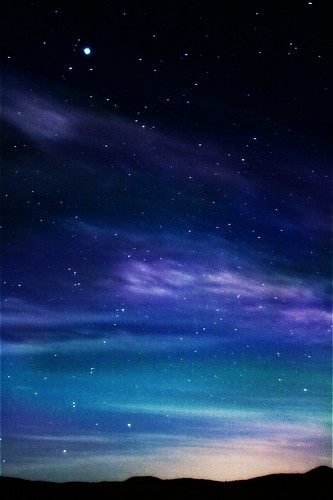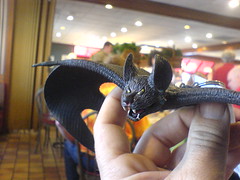It's a lovely way to spend an evening...

(a flickr photo by Kate Williams)
"If you are interested in watching "fireworks" in the night sky, get ready for the Perseid Meteor Showers. The
Astronomy Club will be hosting an all-ages viewing party.
Everyone is invited to the Thursday, August 12th meeting of the Davis Astronomy Club at Fairfield Elementary (26960 County Road 96) starting at 8:00 p.m. You do not have to pay any dues to be a member of the Davis Astronomy Club. If you are interested in the astronomy, you are welcome to attend.
Meteors are often mislabeled as shooting or falling stars. Astronomically speaking, meteors are the luminous streaks in the sky caused by debris particles. When the particles are in space, they are called "meteoroids;" and if any parts survive in Earth's atmosphere and land on the ground, they are known as "meteorites."
As meteoroids enter the Earth's atmosphere from interplanetary space at high speeds, they are vaporized because of friction with air molecules. The light caused by these glowing vapors moves through the sky like a fast moving star forming visible trails and streaks.
The Perseid meteor showers are popular to watch because they occur in August (when the nights are relatively warm) and there are lots of meteors per hour (average 60/hr). Some of them even streak across the sky in long and colorful trails. This year's celestial show peaks on August 12 and 13 with the chance of seeing 50 to 100 meteors per hour.
Meteor showers occur when the revolving Earth passes through a stream of debris left in the wake of a comet during its perihelion (closest approach to the sun). Some of the comet's gases vaporize carrying dust and tiny fragments, and these particles continue to orbit around the sun in the same orbit as the parent comet. When Earth goes through the point in space where the orbits intersect, it results in meteor showers. Perseid meteor showers are attributed to Comet 109P/Swift-Turtle (period 130 years).
There are eight major meteor showers that occur during the course of the year. Even though meteors have real parallel motions and are visible anywhere in the sky, their apparent direction of motion is away from a specific area in the sky called "the radiant." They are hence named after the constellation from which they appear to radiate. Perseid meteor showers radiate from Perseus Constellation.
The best times to see meteor showers are between midnight and sunrise closest to their peaks. More meteors will be visible after midnight because the radiant will be higher in the sky. There will be some meteor activity a few days before and after the most favorable night. Likewise there will meteors visible between sunset and midnight.
Adding to the show will be viewings of Venus (setting at 9:54 p.m.), Saturn (setting at 9:59 p.m.), Mars (setting at 10:06 p.m.) and Jupiter (rising at 9:51 p.m.). There will also be a triple conjunction between Venus, Saturn, Mars and the moon on the following night, August 13.
The Perseids should be spectacular this year, as there are ideal viewing conditions with the thin crescent moon setting around 9:30p.m.
Moon phases: Last Quarter: Aug.3, New Moon: Aug. 10, First Quarter: Aug. 16, Full Moon: Aug. 24.
To watch the meteor showers, all you need is a reclining chair or blanket to lie on and a jacket to keep you warm. Point your toes eastward and look halfway up the sky. Make sure you have an unobstructed view of the sky and look in all directions. Also bring insect repellent and a red-filtered light or a flashlight with a paper bag. Happy viewing!"
(Note: this comes to you word for word, from the Davis Astronomy Club. Sounds like a great time! When my daughter, Liesel, was young, we went with friends to enjoy a Star-B-Que camping trip. We had such fun it took awhile before we realized the evening was totally clouded over and there would be no stars! Jeannie)











